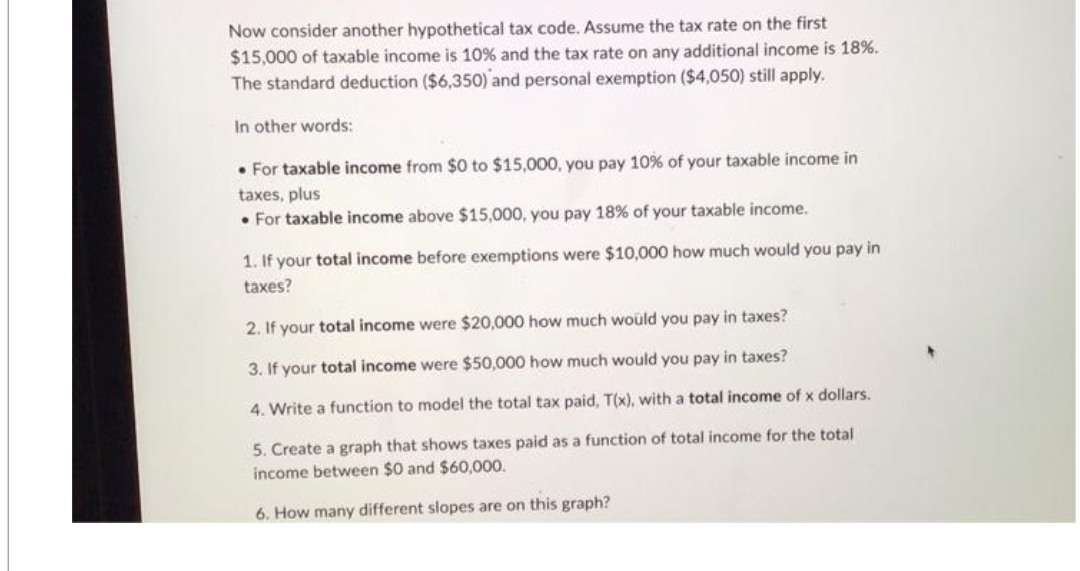Now consider another hypothetical tax code. Assume the tax rate on the first $15,000 of taxable income is 10% and the tax rate on any additional income is 18%. The standard deduction ($6,350) and personal exemption ($4,050) still apply. In other words: . For taxable income from $0 to $15,000, you pay 10% of your taxable income in taxes, plus • For taxable income above $15,000, you pay 18% of your taxable income. 1. If your total income before exemptions were $10,000 how much would you pay in taxes? 2. If your total income were $20,000 how much would you pay in taxes? 3. If your total income were $50,000 how much would you pay in taxes?
Now consider another hypothetical tax code. Assume the tax rate on the first $15,000 of taxable income is 10% and the tax rate on any additional income is 18%. The standard deduction ($6,350) and personal exemption ($4,050) still apply. In other words: . For taxable income from $0 to $15,000, you pay 10% of your taxable income in taxes, plus • For taxable income above $15,000, you pay 18% of your taxable income. 1. If your total income before exemptions were $10,000 how much would you pay in taxes? 2. If your total income were $20,000 how much would you pay in taxes? 3. If your total income were $50,000 how much would you pay in taxes?
Chapter18: Accounting Periods And Methods
Section: Chapter Questions
Problem 47P: How do the all events and economic performance requirements apply to the following transactions by...
Related questions
Question

Transcribed Image Text:Now consider another hypothetical tax code. Assume the tax rate on the first
$15,000 of taxable income is 10% and the tax rate on any additional income is 18%.
The standard deduction ($6,350) and personal exemption ($4,050) still apply.
In other words:
. For taxable income from $0 to $15,000, you pay 10% of your taxable income in
taxes, plus
. For taxable income above $15,000, you pay 18% of your taxable income.
1. If your total income before exemptions were $10,000 how much would you pay in
taxes?
2. If your total income were $20,000 how much would you pay in taxes?
3. If your total income were $50,000 how much would you pay in taxes?
4. Write a function to model the total tax paid, T(x), with a total income of x dollars.
5. Create a graph that shows taxes paid as a function of total income for the total
income between $0 and $60,000.
6. How many different slopes are on this graph?
Expert Solution
This question has been solved!
Explore an expertly crafted, step-by-step solution for a thorough understanding of key concepts.
This is a popular solution!
Trending now
This is a popular solution!
Step by step
Solved in 2 steps with 1 images

Knowledge Booster
Learn more about
Need a deep-dive on the concept behind this application? Look no further. Learn more about this topic, accounting and related others by exploring similar questions and additional content below.Recommended textbooks for you

Individual Income Taxes
Accounting
ISBN:
9780357109731
Author:
Hoffman
Publisher:
CENGAGE LEARNING - CONSIGNMENT



Individual Income Taxes
Accounting
ISBN:
9780357109731
Author:
Hoffman
Publisher:
CENGAGE LEARNING - CONSIGNMENT




